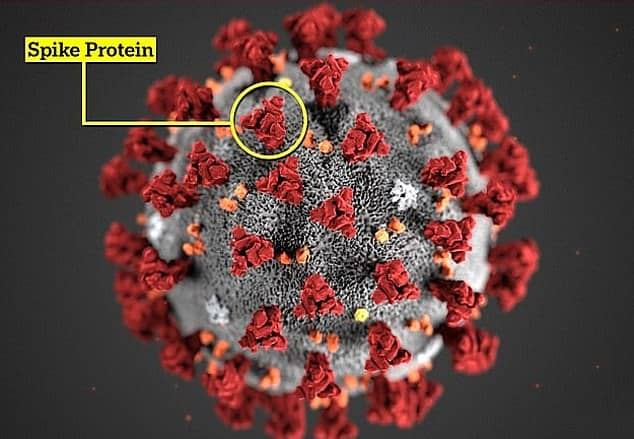
India today claimed it has discovered a double mutant coronavirus variant that spreads more easily and may make vaccines less potent.
It said the the strain, which has two key alterations on its spike protein, was detected in samples in the western state of Maharashtra.
Indian scientists believe the variant is a hybrid of two different Covid strains, which happens when two viruses merge together inside an infected person.
In a press release, the health ministry said the variant’s mutations signal ‘immune escape and increased infectivity’.
But it added the strain had not been detected in high enough numbers to be behind India’s latest wave of infections.
The unnamed variant has two main mutations that concern scientists – E484Q and L452R, which are thought to play a role in transmissibility and antibody escape.
However, British scientists told MailOnline today there was ‘no evidence’ to suggest the virus is a ‘recombination variant’, when two strains merge.
Dr Simon Clarke, a molecular biologist at Reading University, said it was more likely to be a variant that randomly spawned with those two mutations on its spike.
He added: ‘We shouldn’t try to make this out to be something it’s not, because it’s most likely the same thing we’ve seen in other variants, like the one in Brazil and South Africa – which all have multiple mutations on their spike protein. I’ve not yet seen any evidence to suggest it is a recombinant.’
Only one hybrid version of coronavirus has been spotted so far. It was found in the US and was a mix between the Kent variant and a strain found in California.
Dr Clarke criticised the Indian health ministry for claiming the variant is more infectious and may be immune resistant, describing the claim as ‘a bit bold’.
Dr Clarke added: ‘It’s entirely possible that it will turn out this variant does have some immune resistance, but the claim is definitely rather bold.’
He explained the E484Q mutation is a less radical change than the E484K found on the Brazilian and South African variants.
For this reason, Dr Clarke suspects E484Q will not have the same effect as E484K, which makes immunity from vaccines and previous infection less strong.
Dr Clarke said: ‘And as for the L452R mutation, we’re still waiting for a proper definition on what it does.’
The new Indian variant was spotted through genomics sequencing, when scientists analyse the genes of individual samples of positive Covid tests.
The government samples collected from Maharashtra showed ‘an increase in the fraction of samples with the E484Q and L452R mutations’ compared with December last year.
It’s not clear how many cases of the variant were detected, but the government denied that the rise in case numbers was linked to the strain.
In a statement, it said: ‘Though VOCs [variants of concern] and a new double mutant variant have been found in India, these have not been detected in numbers sufficient to either establish a direct relationship or explain the rapid increase in cases in some states.’
In total, scientists from the Indian SARS-CoV-2 Consortium on Genomics (INSACOG) looked at 10,787 samples from 18 states.
A total of 736 were positive for the UK variant, 34 for the South African variant and one for the Brazilian P.1 variant.
Only one hybrid Covid variant has been spotted so far. It was formed from the Kent Covid variant – known scientifically as B.1.1.7 – and a Californian variant called B.1.429.
Scientists in the US claim they merged in a ‘recombination event’, the New Scientist reports. This happens when two different versions of the virus infect the same cell and then swap genes while they are reproducing, giving rise to a new variant.
Researchers have warned in the past that these events are possible but said they are ‘unlikely’ because they require very specific conditions and the coincidence of mostly uncontrollable events. They are more likely to happen during huge outbreaks.
It is believed to have happened in this instance because a number of mutations matching those on the Kent and California variants all appeared in the same place at once. There are no details of the patient and it is unclear whether the combination happened in them, or whether they caught the variant from someone else.
While experts have said there is no need to panic about new variants, one admitted recombination was ‘dangerous’ because it could change the virus so suddenly.
Advertise with the mоѕt vіѕіtеd nеwѕ ѕіtе іn Antigua!
We offer fully customizable and flexible digital marketing packages.
Contact us at [email protected]
















